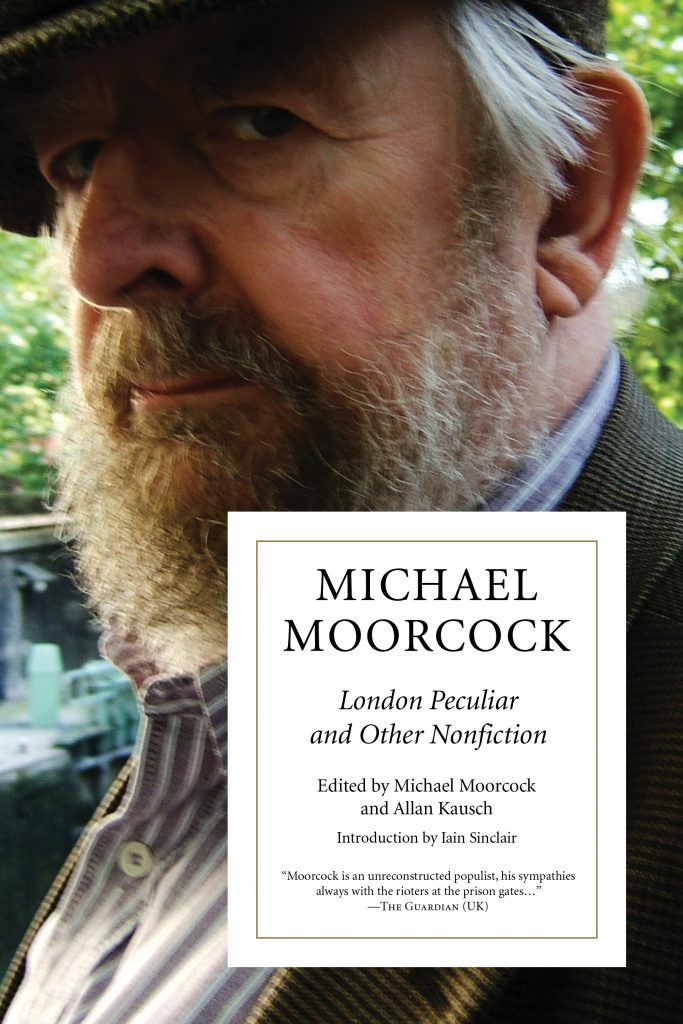by Bryan “zepp” Jamieson
Electric Review
February Spotlight
Michael Moorcock’s latest collection of essays, London Peculiar and Other Non-Fiction
is a mixed bag. It’s divided into sections: London, Other Places,
Absent Friends, Music, Politics, and Reviews and Introductions. “London
Peculiar” presumably refers to the toxic black miasmas of sulfur dioxide
that famously enveloped London from the time of Shakespear until the
1960s, the infamous soft-coal “fogs.”
As someone who, like
Moorcock, was raised in London, I read his accounts of the city with a
fair bit of interest. His was the more dramatic childhood since I came
along about fifteen years later and missed that whole
“insane-Germans-lobbing-high-explosives-at-my-head” thing.
The
most strident Londoner will probably find little of interest in grumbles
from 1980 about how zoning panels are permitting gentrification to ruin
some of the more interesting parts of the city. For all that, I had a
huge laugh at Moorcock noting that surprisingly little of post-war
London was preserved on film, and what there was existed in “Carry On”
movies, and usually blocked by Sid James’ head. I’ve found myself
watching those old flicks and sharing the same complaint. “Hattie! Move
over! You’re blocking Islington! You’re blocking ALL of Islington!” Yes,
I scream at long-dead comedians in fifty year old black and white
movies. I need help.
“Other Places” is mostly about Texas,
where Moorcock resides, and is singularly lacking in the expected
fish-out-of-water element. Moorcock likes his new neighbors, and seems
tickled that he’s better known to them as an amateur musician than as a
writer. His stance on politics, less surprisingly, is puzzled
astonishment at the American flat-earth right.
“Absent Friends”
is a discussion of people who are dead, usually people Moorcock liked
and respected. Andrea Dworkin, JG Ballard, Phil Ochs and Thomas Disch
get loving attention, as they should. Moorcock has a deep respect for
voices which are unique and fearless, and for originality of thought.
This stance informs the entire volume from this point onward.
The
most striking thing about this volume is the level of erudition. It
isn’t enough to say that Moorcock read thousands of books; he ABSORBED
them. He sounds like he did a stint in Disch’s “Camp Concentration” and
survived. He had little use for work he considered facile or
derivative—he dismisses Heinlein, and by extension much of American
“golden age” science fiction—with the single word “mechaporn.” Moorcock
loves the Titus Groan series, found Lord of the Rings a bit of a slog,
and has no use for the Harry Potter books. That’s a good nutshell
encapsulation of his view on literature.
There’s a sense in the
essays themselves of looking back, rather than forward. He’s likely to
write about HG Wells and Conan Doyle, but little or nothing about
present-day writers such as Gaiman, the Foglios, or Stephenson. About
the only active writer he deems worthy of more than cursory mention is
Alan Moore.
Not many people will read every article in the book.
But everyone who reads it will find jewels along the way, and come away
with the realization that the things Moorcock treasures in his
surroundings, his friends, and his fellow artists are among the very
best that life has to offer.
Back to Allan Kauch’s Author Page | Back to Michael Moorcock’s Author Page







